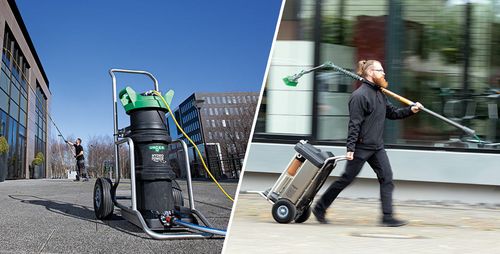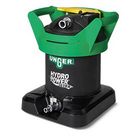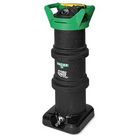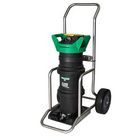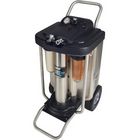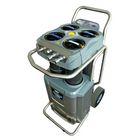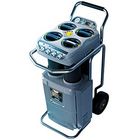What do we actually mean by pure water?
In principle, pure water is water in its purest form. Pure water has a so-called TDS value of 0 ppm. This means that all the minerals that normally lead to limescale residue on glass surfaces have been removed from the water with a pure water filter. Impurities of this type are known as total dissolved solids (TDS). Before water can be described as pure, it has to be 100 percent demineralised.
Why should I clean with pure water?
You are of course welcome to continue with the three-way battle between washing, rinsing and polishing. However, this can be a very tedious, inefficient process, especially on very large cleaning surfaces or in hard-to-reach places.
In contrast, pure water cleaning has crystal-clear advantages. Firstly, pure water has outstanding cleaning power – without the need for cleaning agents, or having to rinse them off and polish the glass. Thanks to the pure water, glass panes remain clean and streak-free.
Pure water cleaning requires just one step, and you can clean surfaces twice as fast as with conventional methods – which is good for your cost calculations. You can also work safely: water-fed pole systems enable you to clean glass panes and façades up to 20 metres above the ground, without the need for ladders or lifts.
What does a pure water filter actually do?
The water that comes out of your tap can be hard or soft, depending on how much hydrogen carbonate it contains. In Berlin, for example, the water is quite hard at 19.5 °dH. In Hamburg, on the other hand, it is much softer at just 7 °dH. If you want to clean with pure water, the hard, medium-hard or soft water at your place of work needs to be demineralised.
Two methods have been established for this purpose: filtering the water by means of de-ionisation (DI) or through reverse osmosis (RO). Both techniques require a pure water filter.
What kind of filter do I need for pure water cleaning?
In order to choose the right kind of pure water filter, you need to take two points into account. Firstly, you need to determine how hard or soft the water is where you are. In Hamburg, where the water is soft, a DI filter could be the right choice. Reverse osmosis, on the other hand, has proven to be effective in hard water situations.
You also need to take the cleaning frequency into account. DI filters are recommended for infrequent cleaning, while RO filters are better suited to regular use.
How does a DI filter work?
The principle behind DI filters is ion exchange. DI filters contain a de-ionising resin which becomes saturated through the exchange of cations and anions and, as a result, produces 100 percent pure water. Ion exchangers are able to replace certain anions or cations in the water with other ions. Depending on the type of ion exchanger, components of hard water such as calcium and/or magnesium ions can be exchanged for other cations. Or to put it more simply: the water flows through the ion exchange resin in the DI filter, which binds the solids and produces pure water.
The service life of the ion exchange resin depends on the hardness of the water. When all the positive and negative molecules which clean the water have been used up, the resin in the DI filter must be replaced.
When should I use a DI filter?
In areas with soft or medium-hard water, it is generally recommended that you de-ionise the water with a DI pure water filter. This method is also suitable for those with limited experience in pure water cleaning, as the initial investment is relatively small and the technology is straightforward. Small DI filters are ideal for occasional use and cleaning environments with limited space. In addition, they do not require an electrical supply.
Please note: the resin in DI filters must be changed after filtering a certain amount of water.
When should I use a reverse osmosis filter?
Reverse osmosis filters are useful in areas with hard or very hard water. They can produce 100 percent pure water with no limescale residue. This method of filtering is also particularly suitable for frequent professional use with high water consumption – for example when cleaning solar power systems. Reverse osmosis (RO) therefore offers many advantages for pure water cleaning.
How does this type of pure water filter work?
In reverse osmosis, water is pushed through a membrane under high pressure. Similar to a coffee filter, the reverse osmosis filter captures the minerals contained in the water. The minerals are constantly flushed out to stop the membrane from becoming clogged. This is why the system also generates “waste water”, also often known as concentrate.
Pure water filters work in three stages: after the water has passed through a combination pre-filter which removes chlorine and sediments, it is pumped through up to two high-performance RO membranes which filter out up to 98 percent of all minerals.
By the way: in order to actually produce 100 percent pure water, a DI filter is often used to fine-tune the results obtained from the reverse osmosis filter. Therefore, RO systems in the proper sense should always be understood as RO/DI systems. In the final stage of pure water filtration, a DI filter is used to remove the remaining minerals.
When choosing the right filter method, note that the pre-filters must be changed regularly – the frequency will depend on the hardness of the water. In terms of costs, this is less important than the high-performance membrane(s) in the reverse osmosis filter, which must be changed every 1-2 years.
Reverse osmosis filters are significantly more expensive than DI filters. However, RO systems score points thanks to their very low running operating costs.
What is the best pure water filter?
Do I need a pure water filter for my cleaning projects? Is it worth investing in an RO system? And which method offers the most efficient way of working? When you input just a few details, UNGER’s new online ROI calculator will provide you with automated advice and recommendations as to which pure water filter is the best choice for you.
Selecting the right pure water filter at a glance
HydroPower Ultra de-ionising (DI) filter
- Affordable initial investment
- Portable for immediate mobile use
- For soft to medium-hard water
- Ideal for users with limited experience in this area
- For occasional use
- Small filter ideal for restricted working areas
- Large filter for larger areas
HydroPower reverse osmosis filter (RO)
- Comparatively high initial investment
- Portable for immediate mobile use
- Requires electricity supply
- For hard to very hard water
- Ideal for advanced and professional users
- For regular use with constant water production and high water consumption
If you have any questions about pure water cleaning, the UNGER customer service team or your personal point of contact will be happy to help.
Your UNGER team

